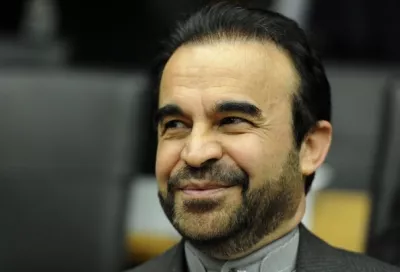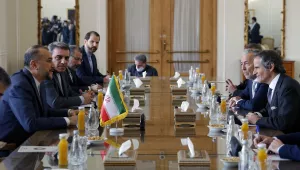"There's a bit of a sense of desperation about coming up with ways to break the logjams, on the nuclear talks and the larger relationship . . ."
- A participant in nuclear talks with Iran, as quoted in the New York Times last week.
So the P5+1 are scrambling to propose ways in which Iran could maintain its installed base of uranium enrichment centrifuges, while disconnecting some of their plumbing. Putting aside sensible questions about why western diplomats would be thinking creatively about how Iran might keep more of its capabilities, it is also clear that those diplomats are fighting a losing effort on questions even more fundamental to preventing Tehran from acquiring nuclear weapons.
Earlier this month, the International Atomic Energy Agency (IAEA) reported that Iran had failed to provide necessary information on two agreed work-plan items aimed at resolving the "possible military dimensions" of Iran's nuclear program, which were originally detailed in November 2011. The missing information relates to initiation of high explosives and to neutron transport calculations.
The IAEA also reported that Iran has provided information and explanations related to Tehran's work on exploding bridge wire detonators, although at an August meeting, "the Agency asked for additional clarifications, certain of which Iran provided."
These issues account for just three of the twelve reasons cited by IAEA for suspecting "possible military dimensions" to Iran's nuclear program.

Prospects for Iranian cooperation are not encouraging. Last week, Tehran's ambassador to the IAEA called the Agency's concerns on these matters "mere allegations . . .without any substantiation," despite having been provided with a detailed explanation of sources, facts, and continuing flows of substantiating information.
So Tehran is wheedling concessions from the P5+1 allowing it to keep more and more of its enrichment capabilities, while blocking all but "very limited progress" on the fundamental issue--Iranian efforts with direct applications to nuclear weapons. It is necessary to get to the bottom of these activities to prevent a covert Iranian program from circumventing any future deal on the declared facilities. Meanwhile, the Western negotiators are beginning to feel a "sense of desperation" about the November 24th deadline for an agreement. This was an entirely predictable situation.
To avoid the trap, the P5+1 must slow their concessions to Tehran and gear overall progress in the talks to supporting the IAEA in its efforts to resolve questions related to the "possible military dimensions" of Iran's nuclear program.
If instead, Western negotiators, driven by their sense of desperation, want an agreement in the worst way, that is exactly what they will get--the worst agreement for those seeking to prevent Iran from acquiring nuclear weapons.
Tobey, William. “"A sense of desperation".” September 23, 2014



